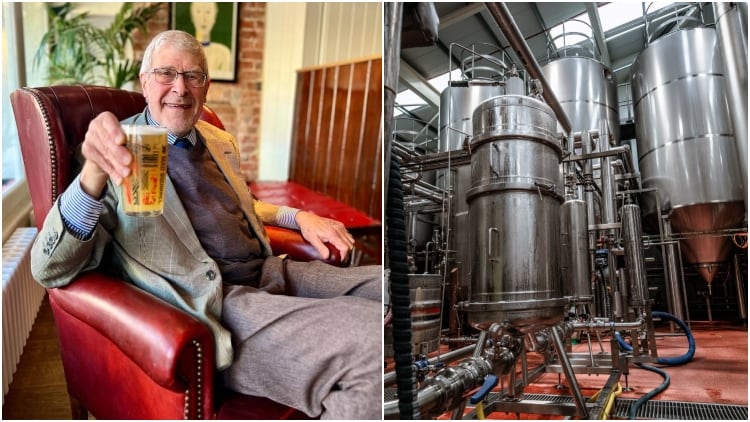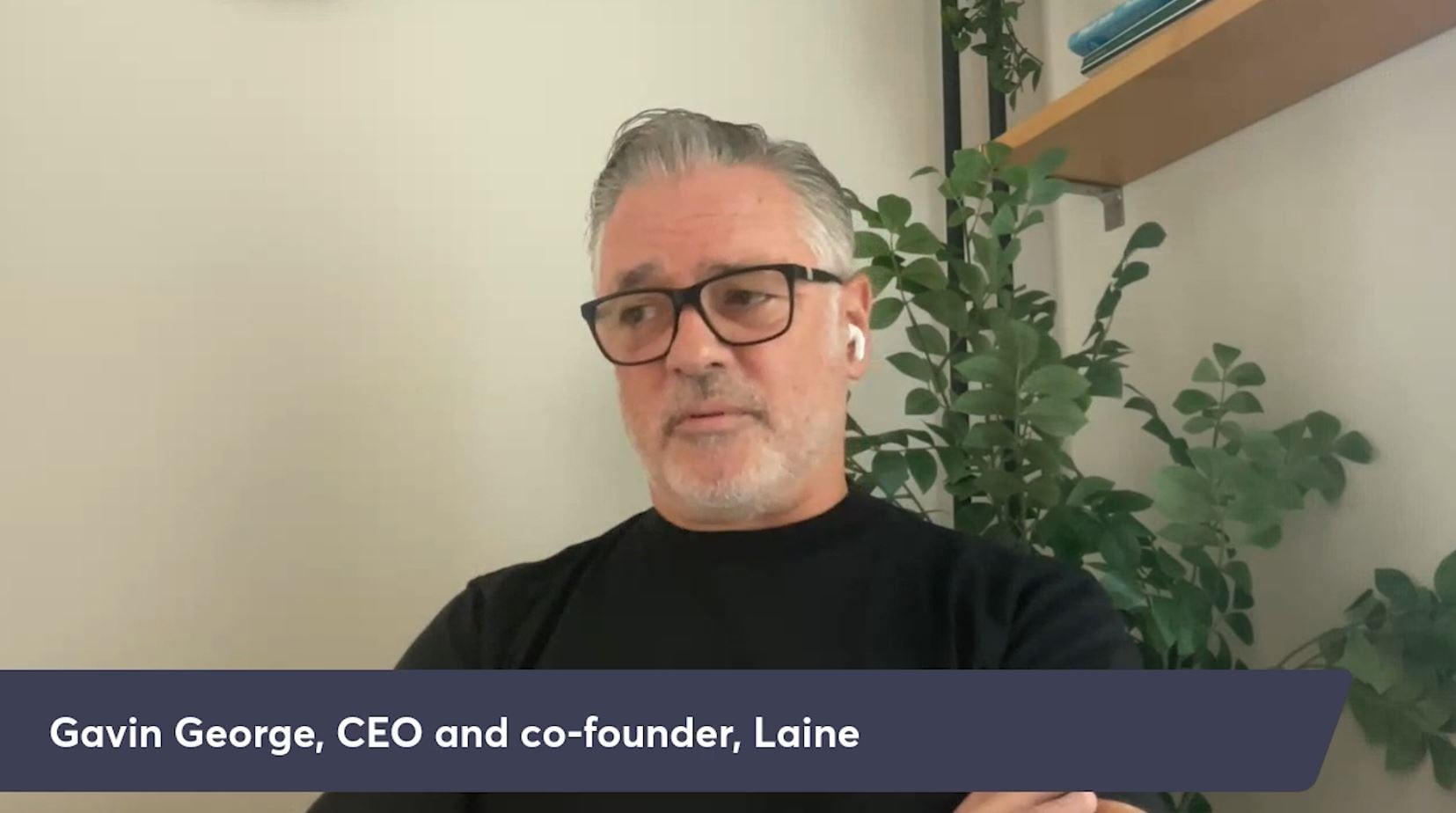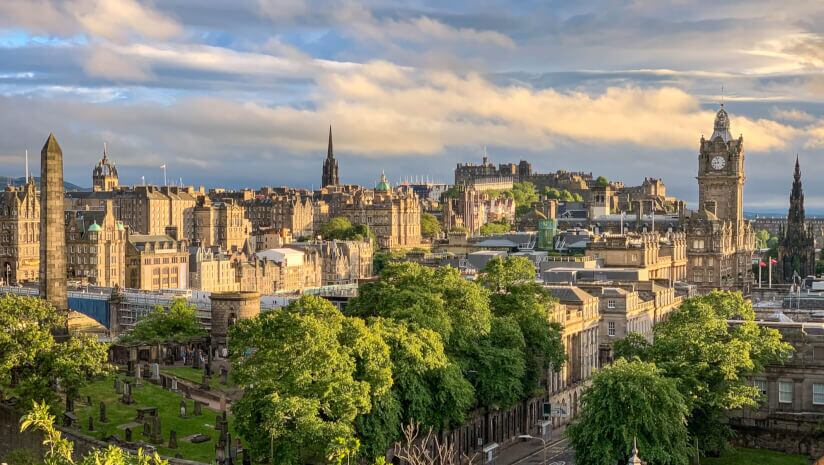But the iconic brewery is no longer there.
In 2019, production moved to the new Dragon Brewery in Cardiff Bay – a move that coincided with financial turmoil that threatened the future of Wales’s most famous beer maker.
Brains has survived and revived, and has adopted an unusual business model. At a time when a number of breweries have closed or sold their plants and turned themselves into pub companies – Marston’s being the most recent example – the Cardiff company has gone in the reverse direction. It has sold its substantial tied estate and is now a stand-alone brewer.
We’re one of the biggest of the small guys
And it remains committed to cask ale. To underscore this commitment, Brains new chairman is Richard Westwood, former head brewer and managing director of Marston’s who has cask running through him like Barry Island on a stick of rock.
Westwood says succinctly: “Cask is fundamental to what we do.” He’s backed by head brewer Bill Dobson who chips in: “We brew more cask than any other style.”
In total, Brains brewed 70,000 hectolitres/40,000 barrels of beer – cask, keg, lager and packaged – in 2023. “We’re one of the biggest of the small guys,” Dobson says.
So why did it all go so wrong for the brewery? It was hit by Covid and pubs lockdown but that happened to all breweries and the results weren’t so catastrophic. Before the pandemic struck, the brewery had run up debts of £67m and it couldn’t service that level of debt.
Chief executive Jon Bridge is frank about the particular problems in Cardiff.
“We lost focus, we borrowed too much money and the banks lost patience with us,” he says.
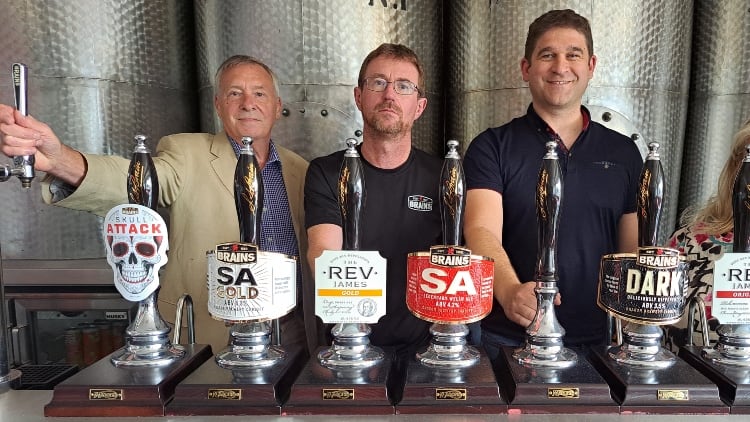
The third brewery
Brains had diversified into coffee shops. It built 100 Coffee#1 outlets that took too many experienced staff away from their main expertise of brewing beer. The coffee shops were sold in 2019 to Caffè Nero.
The cost problems were compounded by building a new brewery that was opened in March 2019 by the then Duke of Cambridge – fittingly now the Prince of Wales – that had to close as a result of Covid when it had only just stated to produce beer. The brewery and the land cost £10m.
It marked the third brewery in the life of a company founded in 1882 by Samuel Arthur Brain. He’s celebrated by one of the main beers, SA, known to its devotees as Skull Attack.
Samuel Arthur and his family built a successful business. Cardiff boomed in the late 19th century as an industrial centre with a vast number of thirsty dock workers, seamen and coal miners.
The brewery expanded in spite of opposition from the church and government to the demon drink, with pubs forced to shut on Sundays.
We’re debt-free now and can concentrate on being a focused brewer
In 1997, Brains moved out of its south Wales heartland when it bought the Crown Buckley Brewery. It could now sell beer in 300 pubs and clubs in west Wales and that era is marked by the popularity today of Rev James, an ale that commemorates the unlikely founder of the Llanelli brewery, the Rev James Buckley.
That year saw the decision by Bass to sell the Hancock’s brewery site next to Central station. Brains closed Buckleys and, as a result its Cardiff brewery, was bursting at the seams. It moved to Hancock’s, which had a capacity of 100m barrels a year. As well as its own beers, Brains was able to contract brew for several national brewers.
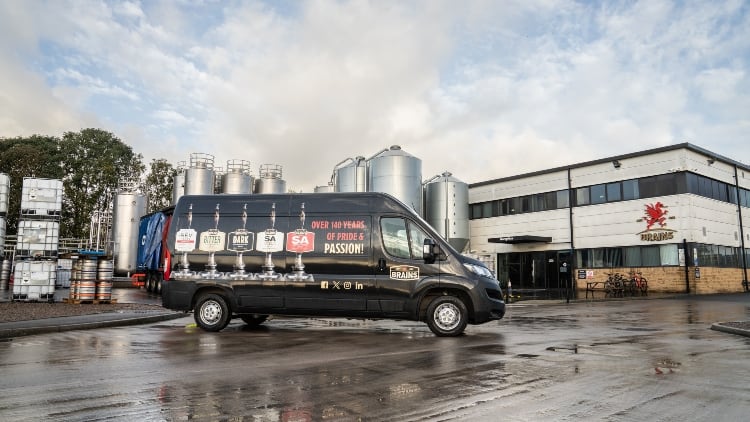
The Brains name was etched on the chimney and became such a hallmark that it’s hard to believe the company was based there for just two decades.
In that time, it struck sponsorship deals with Welsh Rugby, Glamorgan County Cricket Club and the Welsh Football Association. The brewery won worldwide recognition when the national rugby team won the Six Nations and the Grand Slam in 2005, with the name Brains stitched boldly on the players’ shirts.
The move in 2019 to the new Dragon Brewery on Pacific Road in Cardiff Bay was the result of the city centre site needing major investment while the area around Cardiff Central was earmarked for major redevelopment with new retail outlets. The old site was sold for £13.9m.
Pubs leased
The challenge post-Covid was to reduce the crippling level of debt. In 2021, an agreement was reached with Marston’s to lease 156 pubs. The lease is for 25 years and comes with a supply deal to continue to sell Brains’ beers in the outlets. The annual rents total £5.5m.
This agreement was followed in 2022 with a deal with Song Capital to sell the freehold and leasehold of 95 pubs.
Bridge says: “This enabled us to pay off our bank debt and our pension liabilities. We’re debt-free now and can concentrate on being a focused brewer.”
Song paid £85.7m for the pubs. It acts as the landlord while Marston’s will run the pubs and – crucially – will take beers from Brains.
People like the taste, not the history
Brains is now very different company. It has sold its free trade and does direct deliveries. Staff numbers have been slashed from 1,500 to just 30 and the sports sponsorship deals have been ended.
The brewery still owns four pubs but they will be sold. “The cash will be useful,” Bridge says.
The key words at the Dragon Brewery, from CEO Bridge and head of marketing Sara Webber, are “quality” and “tradition”. Cask sales were hammered by Covid and lockdowns but they’re now in growth again.
But Webber stresses the brewery has to innovate to capture new and younger drinkers.
To this end, Dragon has added Bayside, a lager that’s properly aged for around 20 days, and Barry Island IPA, a hoppy ale inspired by the American interpretations of India Pale Ale. Both beers pay homage to south Wales, their names stressing Cardiff Bay and Barry Island seaside resort.
SA has been joined by SA Gold, which has proved popular, especially in JD Wetherspoon outlets, while Rev James is now the brewery’s top-selling beer. If it seems odd that a beer created by a different brewery in west Wales has achieved top spot, Bridge says: “It’s the result of consumer research. People like the taste, not the history.”
Demand beyond Wales
Customers also demanded that Brains Dark should be restored when the pandemic ended and pubs reopened. The dark mild was once Brains biggest-selling beer in the days of heavy industry. It’s now in regular production and should sell well with the revival of interest in stouts and other darker styles.
Webber and Bridge say that while they can’t match the incentives to publicans given by the giant global brewers, there’s a demand for Brains beers beyond Wales. They are meeting that demand by appointing two new sales staff.
But Brains will always play up its Welsh heritage and, to this end, Bridge is preparing a presentation to new MPs to stress the brewery’s importance as a major presence in the region.
Dobson helped design the new brewery that has kit built in Britain, Germany and China. It’s multifunctional and can produce lager as well as ale. It has a 50-hectolitre/30-barrel brew length and the brewing cycle lasts three hours, with eight brews produced every 24 hours.
Brains’ traditional ales use Challenger, Fuggles and Goldings hops while SA Gold has more esoteric varieties with American Cascade and Styrian Goldings from Slovenia. Bayside lager uses German Mittelfrüh hops and Barry Island IPA is brewed with three American hops including Cascade and Chinook to deliver the citrus notes expected by keen drinkers of the style.
Brains has contracts to brew for Molson Coors and AB InBev. It produces Worthington Bitter for Molson Coors and several small brands for AB InBev.
“We brew the beers that other brewers find a bit more challenging” Dobson laughs.
Webber describes Brains as “one of the most iconic brands in Wales.” It’s no longer family-owned but John Rhys, the former chairman, is on the board of directors and is a direct descendant of Samuel Arthur Brain. Catherine Cooke, also on the board, is a member of the Brains clan.
And the history is not forgotten. Bridge says plans for the future could include opening a taproom and microbrewery back in central Cardiff. It would be under the shadow of the famous chimney that still carries the name of Brains, rich in Welsh heritage and tradition.
Westwood dons his brewing boots again

What is Richard Westwood doing as the chairman of Brains?
He worked for Marston’s for 47 years, starting with Banks’s in Wolverhampton in 1975 and rising through the ranks to become managing director of the whole Marston’s group in 2013.
He retired in 2022 but, a few months later, he put his brewing boots back on and joined Brains.
There had always been a close association between the two breweries and Westwood had enjoyed the Welsh beers when he first came across them when visiting Cardiff to watch a rugby match.
“[Brains CEO] Jon Bridge wanted to appoint me because of my experience as a brewer,” he says. “I saw promoting the heritage and potential of the brands as a challenge.”
“I was instrumental in the JV with Carlsberg, it was a very good deal for both companies. I led the integration for two years and unfortunately Covid and increasing input costs put commercial pressure on the original plans.
“Although I fully understand the commercial rationale for the closure of Jennings and Ringwood, I don’t think I would have done it but instead given the brands more support.”
Union Sets
He was proud of the Union Sets used at Marston’s in Burton to produce Pedigree Bitter. The system was developed in the 19th century as a way of cleansing beer of yeast during fermentation in order to produce sparkling pale ale. This was essential at a time when pubs were switching from pewter tankards to glass and drinkers could see what they were consuming.
The Unions were designed to hold a series of oak casks linked together or “held in union” by pipes and troughs. Fermenting beer rises from the casks and collects in troughs above. The troughs retain the yeast while the beer returns to the casks to finish fermenting.
“We struggled for 10 years to keep the Unions going,” Westwood says. “We needed big beer volumes to make them viable and we had to take some of the Union Sets out of operation.
“There were big debates about their cost and efficiency – a lot of water was needed to clean them.”
Westwood says that as a result of the unique character the Unions give to the finished beer – including the sulphury aroma known as the “Burton snatch” – he would have kept them in operation.
Burton will live on
But in January, CMBC announced the closure of the whole system. Westwood is pleased that one Union Set has been donated to Thornbridge Brewery in Derbyshire where it will produce special beers, including collaborative ales with other brewers, using its Union.
Marston’s has now sold its breweries to Carlsberg and will become a pub retailer. Westwood doesn’t think this will mean the end of brewing in Burton.
“Wolverhampton is pretty full,” he says. “They’re brewing mainly Wainwright’s, Shipyard and Tetley as well as the Banks’s beers. Hobgoblin is mainly brewed at Burton.”
He points out Carlsberg’s giant brewery in Northampton can produce ale as well as lager and Tetley Bitter was briefly made there when the Leeds brewery closed.
But now all Westwood’s attention is on Brains where he will use his passion for cask to bring the Rev James and SA to a wider audience.

